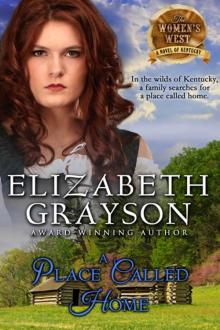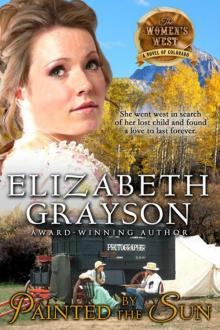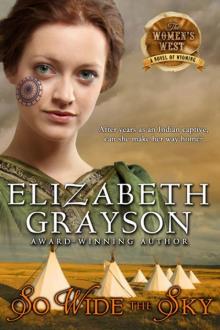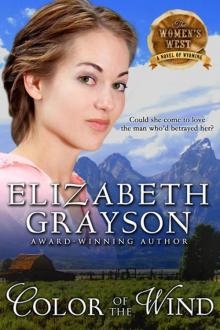- Home
- Elizabeth Grayson
Color of the Wind Page 12
Color of the Wind Read online
Page 12
Khy lay beneath him, curled in the dust.
Ardith's hands went cold as she searched for signs of life in the younger boy. Then she realized his shoulders were quaking, and tears were streaking down his dusty cheeks. Baird drew Khy's small, quivering body into his arms.
"I didn't mean to m-m-make that cow so m-m-mad," the boy whimpered.
Baird drew him closer, his big, work-gloved hands moving over his son, soothing and assessing. "Are you hurt, boy?" he asked his son softly. "Are you hurt?"
Ardith realized his voice was shaking.
Khy snuffled back his tears. "No. I don't think so."
Baird's shoulders sagged, and his back lost its rigidity. He rose, stood the boy on his feet then swiped at Khy's tears with the rough leather thumbs of his gloves.
Ardith curled her hand around Durban's elbow, and eased him closer. "Did that cow kick you?"
The older boy shook his head. "Her hoof grazed my shoulder is all."
She turned him around and saw that blood was spreading down the back of Durban's shirt. Her mouth was suddenly hot and cottony, but she managed to keep her voice level. "I think Durban needs some tending."
As if sensing that there was trouble, cowboys had come from all directions. China and Matt had run over from the corral. Thornton Watkins's horse skidded to a halt, and the captain leaped out of the saddle.
"What's going on here?" he demanded.
"The boys got between a heifer and her calf," Baird explained as Ardith eased Durban toward the Sugar Creek's chuck wagon.
Jubal Devereau had already pulled out the box of medical supplies by the time Durban was settled on an upturned keg. Ardith helped him out of his shirt, revealing a deep, bloody gash curved like a sickle around his shoulder blade. Her stomach pitched at the sight of it.
Watkins and Devereau stood over the boy consulting. "It's not serious," Watkins pronounced, "but it's going to need stitching. You want to do that, ma'am?"
The idea of pushing a needle through anyone's flesh—much less Durban's—made Ardith's lunch back up in her throat. "Crewelwork is my specialty," she joked weakly.
"Then I'll take care of it," Watkins said. "That all right, boy?"
Durban managed a feeble smile. "Sure."
"Ah, Watkins is an old hand at this," one of the cowboys assured him. "It won't hurt more than stubbing your toe."
"Hell," a short, grizzled cowman volunteered, "he stitched me last year from knee to groin, and I never felt so much as a twinge."
"Yeah, Jake," someone else put in, "but you drunk down half of Watkins's medicinal whiskey before he even got out his needle and thread!"
The cowboys hooted with laughter.
Durban did his best to join in. "I guess I'll be all right then," he agreed and glanced at his father for confirmation.
That lingering look between Durban and his father was the first hopeful sign Ardith had seen yet.
Until Baird inexplicably turned and walked away.
What in the name of God was Baird doing? How could he rebuff his son when the boy needed him?
"You'll be fine, boy," Ardith heard Buck Johnson murmur as she stalked in the direction Baird had gone. She found him on the far side of one of the chuck wagons, standing with his hand braced against its side and his head bowed low.
"Just what in bloody hell are you doing?" she demanded, her voice raw with fury. "How could you walk away from your son when he finally turned to you?"
Baird's head jerked up. He seemed shaken and pale beneath the stubble of that days' old beard. There was confusion in the depths of those bright blue eyes.
"I just couldn't stay there and watch Watkins stitch Durban up," he admitted, his breathing catching a little. "I didn't think something like this could bother me—but it does."
He'd just discovered his vulnerability where the children were concerned. Ardith experienced an unexpected twinge of sympathy, but refused to indulge it.
She stepped in close instead, all but spitting the words in his face. "It doesn't matter how you feel. It's time you started thinking of those children instead of yourself. And Durban needs you."
He blinked at her. "Durban needs me?"
"Of course he needs you," she answered. "You're his father. He needs you to tell him how strong and brave you think he is, how clever and resourceful. Don't you realize what that boy did, how much he risked by going after his brother?"
"I know what he did—"
"He needs you to stand beside him, Baird, while Watkins stitches him up. And when it's over, he needs you to compliment him on how well he did."
She could see flickers of understanding in him. "You be a father to your son, Baird Northcross," she whispered fiercely. "You be a father to him—it's what he needs more than anything!"
Baird let out a long, shivery sigh. He swallowed hard and nodded.
Finally.
On the strength of that nod he brushed past her and paused by the rear wheel of the wagon. Though she could not see his face, she imagined that he was battling his own fears, gathering his fortitude. He scrubbed his mouth with the back of one hand; blew a long, uneven breath; squared his shoulders, and rounded the corner of the wagon.
Once he was gone, Ardith sagged back against the side of the wagon, her knees quivering. She was a little amazed that she'd stood up to Baird. But seeing him walk away when Durban needed him had unleashed such powerful feelings in her, such ferocious protectiveness for this brave but fragile boy, such unbridled fury.
Such overwhelming love.
The realization of how much she had come to care for these children made her go weak and warm inside, frightened and fierce. It made her want to gather them up and hold them. Made her want to assure them that no matter what happened, they would always have her to hold on to, that they would have her to care for them no matter what their father did.
She hadn't known she had the capacity to love so hard or want to give so much. Still, this wasn't the time to dwell on what she'd just discovered about herself, or the glimmers of concern for the children she'd seen in Baird. Durban needed her now every bit as much as he needed his father. She did her best to pull herself together and went back to where the cowhands had gathered around her gallant boy.
They got through the stitching somehow. Baird held Durban's shoulders still while Watkins worked. Ardith bit her own lips raw waiting for it to be over. Though a few tears slipped down Durban's waxen cheeks, he never uttered so much as a murmur of complaint.
When the older man had finished his needlework and bound the wound, the cowboys clustered around Durban claiming him in their own way.
"You're a game one," one of the '76 cowboys assured him.
"If push come to shove, I sure wouldn't mind having you riding with me," another mumbled approvingly.
"When you're a little older, boy, you'll be able to impress the women with that fine scar," Jeff Mason put in.
"You did well," Baird murmured, and to Ardith's ears his voice seemed deeper, warmer than usual. She looked up, waiting for him to go on, to tell Durban how proud he was of him, how brave he'd been to rescue his brother.
Baird didn't say any of that. He stood turning his hat in his hands, while Durban waited.
Cullen McKay spoke up instead. "Durban, my boy! I'm so gratified to know a fine young man as brave as you. Do you realize you saved your brother's life? It took courage to stand your ground when that cow charged. I can think of grown men who wouldn't have handled the situation any better."
Durban seemed to bloom in the light of Cullen's praise. His eyes brightened. A slow smile transformed his face.
Baird turned away, and Ardith wished with all her heart that he had fought Cullen McKay for his son's favor. This was what Durban needed, this attention and approval of grown men after living sheltered so long as her sister's child.
Before she could think of a way to intercede, Buck approached her. "The wagon's all hitched up. I thought after this you and the children might want to head back."
<
br /> "I think that's wise," Ardith agreed. Durban wouldn't admit it, but his wound must hurt. Myra would have potions and poultices at the house to ease his discomfort.
"He's quite a boy, our Durban," Johnson observed. "Quiet, but with lots going on underneath. He's like his father in that."
"Like Baird?" Ardith echoed. Could Buck see more in Baird than she could?
The older man nodded. "At least you won't be missing much. We're mostly done branding. I know you were planning to drive on to tonight's encampment and stay to supper, but maybe it's just as well you're heading home in the daylight. You will tell Myra I miss her, won't you?"
Ardith smiled. The warm relationship between Myra and her husband delighted Ardith in a way she couldn't quite explain. "I surely will."
"And Mr. Northcross said to tell you he'd ride back with you, to see you got home safe."
"Good," Ardith said, strangely gratified by Baird's decision. She bid Buck good-bye and headed off to gather up the children.
Sugar Creek Ranch
June 15, 1882
Dear Gavin,
The roundup was wonderful—even more exciting than I had expected—though on the surface it seemed like chaos. The cattle bawl ceaselessly. The smoke from the branding fire stings your eyes, and your throat gets raw from breathing dust. The men are constantly busy in a dozen different activities, most of which involve hard riding or hard work. I was tremendously impressed by the way the seasoned hands maneuver their horses in among the cattle, how they select the one they want, and separate it from the rest of the herd. Doing that entails some of the most daring horsemanship I have ever seen. Though the enterprise seems wildly uncoordinated, the afternoon we visited, they branded over four hundred calves. I can't say it is the most efficient way to count the cattle, or brand them, or doctor them, but it is colorful and exotic. And far more enervating than anything I have ever done in my life.
Of course the visit the children and I paid to the roundup encampment was not without incident. What event that involves these children is? A cow charged Khy, and Durban jumped in to save him. In the process Durban sustained a nasty gash, which, I'm pleased to say, is already looking better. He is a brave lad, and it concerns me that his father seems unwilling to acknowledge it. But that is another topic entirely, one I will not burden you with today.
I do so wish, Gavin, that you could have been here and gone to the roundup with us. You would have been as fascinated as I was by the rough poetry of the riding, the pagan ritual to the branding, and the sheer beauty of this aspect of this land. Since you were not able to accompany us, I have tried to capture a bit of the spectacle in the painting at the top of this page and the vignettes at the bottom. I hope they give you a flavor of what we saw. It was undoubtedly one of the most fascinating experiences I've ever had.
Now, on an entirely different topic—I have begun writing the text for my next book. How do you feel about me giving Harland Hedgehog his own story? Please let me know before I go on to start the illustrations.
I look forward to hearing from you soon.
Fondly,
Ardith
Chapter 7
China burst into the ranch house, her face flushed and her hair flying. "Aunt Ardith," she demanded, throwing herself into the chair opposite where Ardith was painting at the long pine table. "Have you ever been in love?"
Ardith made a blot in the middle of the illustration she'd been working on and stared up at her niece. She was stunned by the bluntness of the question—had she ever been in love?—and overwhelmed by its implications. Had Ardith been in love with this child's father?
The heat of a blush surged upward, scorching her neck and cheeks. How was she to answer her niece? Was she to say that she'd been fascinated by the bold adventurer who'd become her fiancé, that she'd been flattered by Baird's attention? Could she tell China that she'd been infatuated, irresistibly drawn to the man whose defection had broken her trust so completely that it was only now—sixteen years later—that she even dared to be attracted to another man?
"No," Ardith answered. "I've never been in love. Have you?"
"I don't know." The girl lowered her gaze, shading her eyes with her long, gold-tipped lashes. "I think I am."
China had spent the morning with Matt Hastings and had about her a glow that went well beyond the one from her fresh sunburn. Ardith hadn't felt that flush in years, but she knew what it was—a sense of excitement and delight and anticipation. When Baird had come calling all those years ago, Ardith had felt like this, like a flower budding, about to burst into bloom.
"What makes you think you are in love?" Ardith asked warily, knowing she was wading in beyond her depth.
China shrugged a little and looked away. "I think about Matt Hastings all the time. We have fun when we're together. He makes me feel so good, as if I'm smart and not just pretty. He says he'd rather be with me than anyone. And when he kisses me—"
"Matt's kissed you?" Baird would be apoplectic when he found out about that.
China's already flushed cheeks went the color of geraniums. "Well, yes, he has. But only twice. And when he does I get this funny, dizzy feeling in my stomach."
Ardith knew the feeling.
"Is that love, Aunt Ardith?"
Dear God, how was she to know? It was on the tip of her tongue to tell her niece what she knew she should—that nice young women didn't kiss men. That nice young women's stomachs didn't buzz with excitement and anticipation. That it was wrong, scandalous to feel such things.
But then Ardith was too forthright to fob her niece off with that lie. She knew how it felt for a man to curl his hands around your shoulders, for him to draw you close. She remembered what it was like to look up into a man's face, smell the tang that clung to his freshly shaven cheeks, and lose yourself in his eyes. She'd experienced the soft, anticipatory mingling of breath, the brush of his mouth.
The strange, sweet hum in your blood and the warmth seeping through you. Was that love?
"It might be love," Ardith conceded, feeling flushed and shaken and like she was groping in the dark, "but, China dear, love is so much more than kissing. It's common interests and common dreams. It's wanting to make a life with someone, to start a family. And you're only fifteen..."
China shot to her feet, transformed in an instant from a questioning child to an outraged young woman. "I knew you'd say that," she accused. "I knew you'd tell me I was too young to be in love. And now you'll feel duty bound to inform Father that I've been kissing Matt."
Ardith frowned, strangely reluctant to forfeit her niece's trust. "I won't tell him," she bargained, "if you promise—"
"Promise what?"
Ardith's mind spun. What had Ariel told her daughter about relations between men and women? Did Ardith have either the gumption—or the expertise—to discuss such intensely intimate things with her niece?
"I want you to promise me that you won't go off alone with Matt," she bargained, buying time. "That you won't let Matt kiss you more than good-bye."
"But I like it when he kisses me."
Ardith nodded. "I imagine you do. But if I'm to refrain from discussing what you've told me with your father, I need some assurances."
China pursed her mouth and thought that over. "All right," she agreed. "I'll do as you ask, but I can't say I'll like it."
Ardith gave a wry twist to her lips. "Welcome to adulthood."
China cast her a resentful glance, then turned toward the kitchen. "I finished reading A Christmas Carol last night. I'm going to see what other books Myra has in her collection."
Ardith watched China flounce away, wondering if what she'd done was right. She could hardly sanction a romance between this child and one of the ranch hands. The girl was far too young, for one thing—and an earl's grandniece for another. But Matt was a nice young man who clearly held China in high regard. And for all her tender years, China had a sense about men.
She's like her mother in that, Ardith thought, remembering the
way men had been drawn to her sister, and how Ariel had managed and maneuvered them. China was capable of that, but she had also been tempered by her parents' marriage. She would be more wary of love than her mother had been. And now that Ardith knew about China and Matt, she could keep an eye on them.
Officially, of course, her agreement with Baird to stay and take care of the children had ended three nights before, when he and the rest of the hands had come home from the roundup. She should be leaving for Massachusetts any day. But she could see that Baird was nowhere near ready to handle China and the boys on his own, and she no longer minded staying for the children's sake.
Or for her own. She liked Wyoming, liked the space and the freedom. This house was so different from the one in Concord. It was busy and noisy and filled with life. There was turmoil every day, and Ardith had come to thrive on it.
Nor had Baird said anything to her about leaving. She supposed she should resent him taking advantage of her, but she couldn't quite manage that.
Late that afternoon, just as Ardith was putting the finishing touches on the first illustration for the book on Harland Hedgehog, Baird came in from somewhere out back. As he crossed the room, she saw him glance in toward the desk where the pile of correspondence from London had grown to gargantuan proportions.
"You're going to have to go through that sooner or later," she warned him.
Baird stopped beside her with a jingle of spurs. "I know," he admitted with a sigh. "But when I do, they're going to want to know the number of cattle here on the ranch and how many I'll be taking to market. They're going to ask about finances, and I can't make heads or tails of those ledgers. If they wanted reports, they should have sent a goddamned clerk."
The force of his frustration buffeted her. "Why did they send you here?" she asked him.
He shrugged, his shoulders bunching. "My uncle sent me to Wyoming because he didn't know what else to do with me."
It was the truth. Ardith could see that. But there was more to it, much more. She caught the creep of shadows at the backs of his eyes. His defensiveness rose like a barricade between them. She wasn't sure she should question him too closely, but she had to do something to make things better.

 A Place Called Home
A Place Called Home Painted by the Sun
Painted by the Sun So Wide the Sky
So Wide the Sky Color of the Wind
Color of the Wind